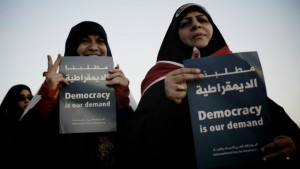Bahrain and the Compliance Gap
The current situation in Bahrain is one of political strife and violence. This fact is not lost to the American government but it is one that continues to be ignored by both the press and media. In 2011 as the Arab Spring spread throughout the Middle East, tensions in Bahrain boiled over into a month long series of protests and demonstrations. The Shiite civilian majority of Bahrain was engaged in a political struggle with the Sunni autocratic leaders, whom the citizens feel have excluded them from the political sphere. Protests took place from February 14th to March 18th. On February 17th the protests turned deadly and dangerous, as the military started firing gas and rubber bullets into the crowds. In addition, there were mass arrests, house raids, denial of medical care and imprisonments. On February 22nd more than 150,000 Bahraini citizens gathered around Pearl Roundabout to protest. The uprisings were squashed after 1,000 Saudi and 500 UAE troops entered after a plea from Bahrain for assistance.
Even though the uprisings have stopped, protests still occur regularly in Bahrain[1]. Despite the growing violence and human rights violations the American and International community have refused to intervene or provide any substantial condemnation. The reasoning for this lack of intervention is the inherent interests of the US military and Arabic stability that reside in keeping a positive relationship with the current leadership of Bahrain[2]. These interest lie in three main arguments. First, Bahrain is a military stronghold with the extensive fifth fleet being housed on Bahrain’s shores. The Fifth Fleet is a naval operation that is in charge of the volatile region of the Persian Gulf, Red Sea, Arabian Sea, and some of the Indian Ocean. Second, trade between the two countries is high. While Bahrain’s oil reserves have diminished they are still in close partnership with the USA in creating new innovations. During the year 2012, bilateral trade was in excess of $1.9 billon. And lastly, the US government wishes to avoid further insurgency in the region. American officials fear that by allowing the protests to go on and dispose the current rulers, that Bahrain will become vulnerable to terrorist organizations. There has been fear that Al-Qaeda will start to move into Bahrain to entice the Shiite population.
While it is understandable that these motivations are keeping the United States and its allies quiet on the subject, in the long run the devastating effects that dismissing the protests have on the United States’ credibility are immense. The interest the USA has in Bahrain is a clear example of the difficulties in enforcing compliance in global governance, even when human rights violations are present.
[1] McDaniel, Richard. Brookings Institute. Publication. June 2013. http://www.brookings.edu/~/media/research/files/papers/2013/06/24-us-strategic-access-middle-east-bahrain-mcdaniel/24-us-strategic-access-middle-east-bahrain-mcdaniel.pdf.
[2] Ibid.

